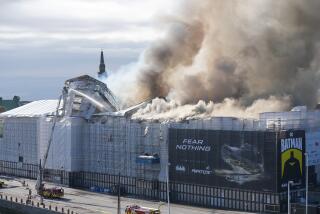Iraq attacks kill at least 52 people
A series of attacks largely targeting Shiite Muslims killed at least 52 people Friday, most of them in a powerful car bombing at a mosque on the northern edge of the volatile city of Mosul.
Authorities said most of the 39 fatalities at the mosque were Shiite Turkmens, a minority group that has frequently been targeted by the Sunni Arab militant group Al Qaeda in Iraq to inflame sectarian and ethnic tensions.
The massive bomb exploded as worshipers were leaving the mosque in the village of Shiraykhan after attending Friday prayers, officials said.
The bombing, which demolished 10 nearby homes, is certain to raise tensions between Kurds, who control the area, and the Sunni Arab administration of Nineveh province, of which Mosul is the capital.
Nineveh’s governor, Atheel Najafi, has been pushing for the Iraqi army to be deployed in place of the peshmerga Kurdish militia across a swath of territory currently controlled by Kurds. Najafi accused the peshmerga of responsibility for the bombing for “allowing criminal elements in this area to carry out their attacks,” and said it demonstrated the need to extend the authority of the Iraqi army into the area.
Kurds, however, have frequently accused Najafi of having ties to insurgents, and want most of the land they control to be formally annexed to their self-governing region of Kurdistan.
In Baghdad, seven Shiite pilgrims were killed in three bombings as they returned home from a pilgrimage to the holy Shiite city of Karbala.
Six more people died Friday evening when a bomb hidden in a motorcycle exploded near a busy marketplace in a Sunni neighborhood of west Baghdad. The target appeared to be a police car parked nearby, and officials said three of those killed were police officers who had been in or near the car.
A week earlier, 29 people died in attacks targeting Shiite mosques around Baghdad.
Since U.S. forces withdrew from Iraq’s cities June 30, a predicted surge of violence has not materialized. But attacks persist, and bombings such as Friday’s serve as a reminder that the threat of mayhem still exists.
Such is the government’s confidence in the capability of the Iraqi security forces to keep the peace in Baghdad that Prime Minister Nouri Maliki this week ordered the removal within 40 days of the towering concrete barriers surrounding the capital’s neighborhoods and fortifying government institutions.
The walls have protected buildings from bombings and segregated Sunni and Shiite areas.
But they have also been an inconvenience for residents, who often must wait in line for hours to enter their own neighborhoods through a single gap.
--
Hameed is a Times staff writer. A special correspondent in Mosul contributed to this report.
More to Read
Start your day right
Sign up for Essential California for news, features and recommendations from the L.A. Times and beyond in your inbox six days a week.
You may occasionally receive promotional content from the Los Angeles Times.






